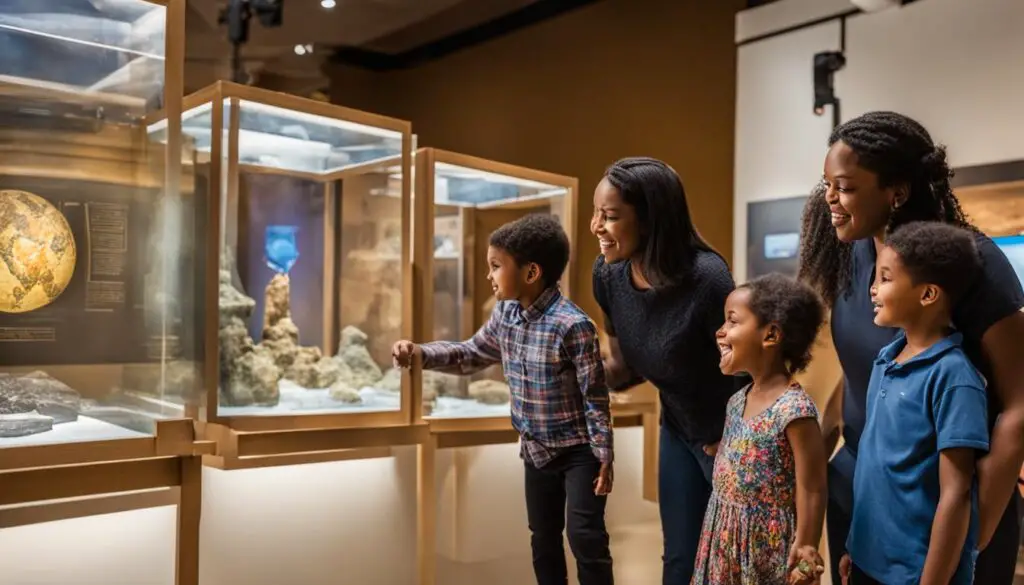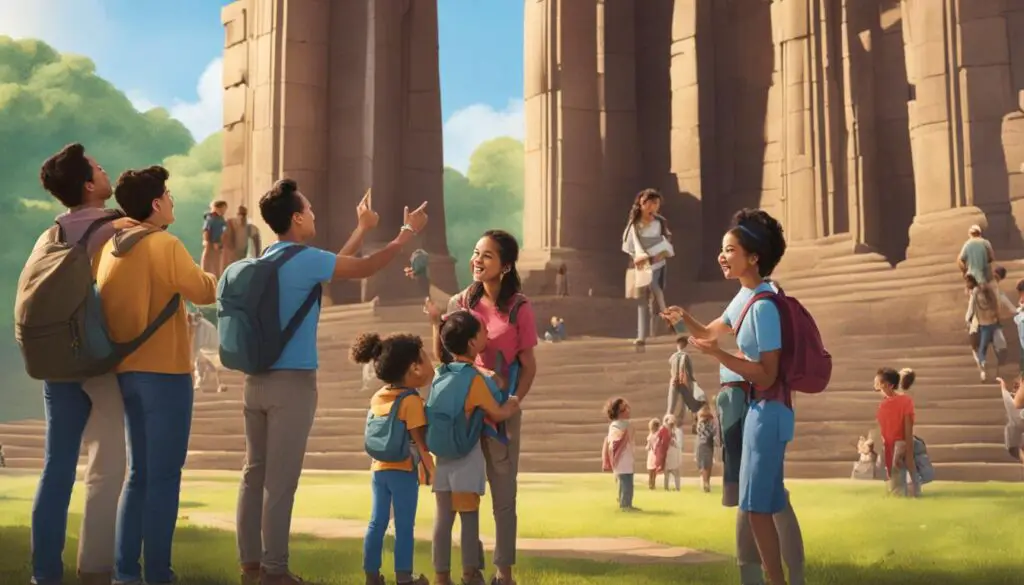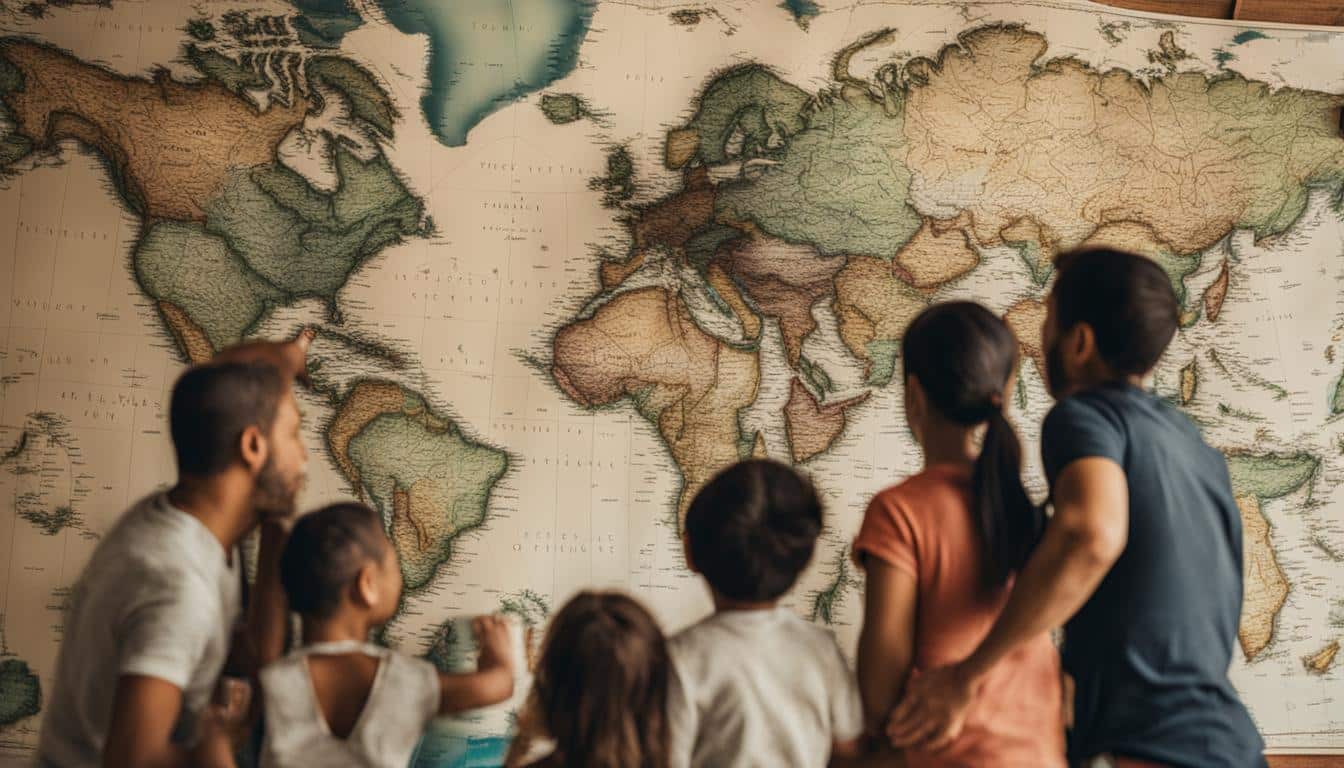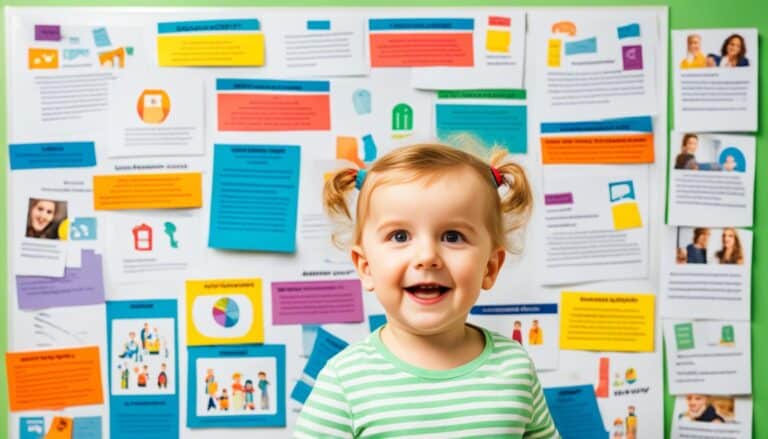Planning Educational and Fun Family Vacations
Planning a family vacation that is both educational and fun can create memorable experiences for all ages. In this article, I will explore tips, ideas, and destinations that will help you plan the perfect educational family vacation. These tips have been compiled from various sources and are aimed at creating engaging and enriching opportunities for learning during your family trip.
Key Takeaways:
- Research and plan your destination based on educational benefits and your children’s interests.
- Consider incorporating historical landmarks, museums, and outdoor activities for valuable learning experiences.
- Encourage socialization and interaction with other families for a well-rounded educational vacation.
- Get creative with learning by using living books, costumes, and interest-based activities.
- Educational vacations provide hands-on learning, cultural immersion, and lasting family memories.
Tips for Planning an Educational Vacation
Before embarking on your educational family vacation, it is important to make an education plan for the trip. Research your destination and look for educational benefits that align with your kids’ interests and curriculum subjects. Consider historical landmarks, museums, geography, language arts, and science-related activities.
Embracing the outdoors and spending time in nature can also provide valuable learning experiences. Encourage socialization by interacting with other families and teach your kids how to meet new people in a safe way. Keeping a journal and discussing what they learned each day will help reinforce their learning experiences.
- Research educational attractions and landmarks in your destination.
- Look for museums, science centers, and historical sites.
- Plan outdoor activities that promote learning about nature and the environment.
- Encourage socialization by joining group activities or finding opportunities to interact with other families.
- Keep a journal and have daily discussions about the educational aspects of the trip.
By incorporating these tips into your vacation planning, you can create a well-rounded educational experience for your family that combines fun and learning.
Traveling is not just about exploring new places, but also about exploring new knowledge. By planning an educational vacation, you can provide your children with the opportunity to learn in a hands-on and immersive way, making their travel experiences both memorable and enlightening.
Finding Educational Benefits in Your Destination
When planning your educational vacation, take the time to research your destination and identify the educational benefits it offers. Look for attractions, landmarks, and activities that align with your kids’ interests and the subjects they are learning in school. By incorporating educational elements into your trip, you can make learning a central focus and create a meaningful experience for your family.
| Subject | Suggested Activities |
|---|---|
| History | Visit historical landmarks, take guided tours, or participate in reenactments. |
| Science | Explore science museums, visit zoos or aquariums, or participate in interactive experiments. |
| Geography | Take nature hikes, explore national parks, or visit geographical landmarks. |
| Language Arts | Attend local cultural events, visit libraries or bookstores, or take part in storytelling sessions. |
Remember to also embrace the outdoors and spend time in nature. Whether it’s hiking through a national park, observing wildlife, or stargazing, the natural world provides endless opportunities for learning and exploration.
Interacting with other families can also enhance the educational experience. Encourage your children to strike up conversations and make new friends while respecting personal boundaries and safety. This will not only develop their social skills but also expose them to different perspectives and cultures.
Finally, encourage your children to keep a journal throughout the trip and write about the things they have learned and experienced each day. This will help reinforce their learning and provide a record of their educational journey.
Family Vacation Ideas and Destinations
If you’re looking for the best family vacation destinations that offer both educational and fun experiences, you’re in luck! There are numerous options that cater to different interests and budgets. Whether you’re interested in American history, outdoor adventures, or cultural exploration, there’s a destination out there that will captivate your family’s imagination.
1. Washington, D.C. and Colonial Williamsburg, Va. – Immersive American History
In Washington, D.C., you can visit iconic landmarks such as the Smithsonian museums, the Capitol Building, and the Lincoln Memorial. Explore the rich history of the United States and make learning come alive for your children. Just a couple of hours away, Colonial Williamsburg offers an immersive experience where you can step back in time and learn about colonial life firsthand.
2. Hawaii – Beaches, Hiking Trails, and Wildlife
Hawaii is not only a tropical paradise with stunning beaches, but it also offers a plethora of educational opportunities. Explore the volcanic landscapes of the Big Island, hike through lush rainforests, and discover unique wildlife both on land and in the ocean. Learn about the Hawaiian culture and history during your stay.
3. New York City – Broadway Shows and Museums
The vibrant city of New York offers a mix of entertainment and educational experiences. Take in a Broadway show, visit world-renowned museums such as the Metropolitan Museum of Art and the American Museum of Natural History, and explore iconic landmarks like the Statue of Liberty and Central Park.
4. Sedona, Ariz – Hiking and Nature Exploration
For families who enjoy outdoor adventures, Sedona is a perfect destination. Explore the stunning red rock formations, hike scenic trails, and learn about the geology and natural history of the area. Sedona also offers opportunities for stargazing and learning about Native American culture.
5. Explore Your Own City – Local History
Don’t forget about the educational opportunities right in your own backyard! Take the time to explore your city or nearby towns and discover the local history, museums, and landmarks. Learning about the history and culture of your own community can be just as enriching as visiting far-off destinations.
Remember, educational travel for families doesn’t have to be expensive or extravagant. Choose destinations and activities that align with your family’s interests and budget. By combining fun and learning, you can create unforgettable family vacations that inspire curiosity and foster a love of exploration.
Continue reading to learn more about getting creative with learning during your educational family vacation!
Getting Creative with Learning
When planning your educational family vacation, it’s important to think outside the box and find creative ways to make the learning experience even more engaging for your children. By incorporating different learning methods, you can ensure that your family trip is not only educational but also fun and memorable.
One way to spark interest and imagination is by using living books as a springboard for ideas. These books bring history, science, and other subjects to life through captivating narratives and illustrations. Before your trip, encourage your children to read these books and discuss the stories, characters, and themes. This will enhance their understanding and make the destination even more exciting.
Another fun idea is to dress up in costumes when visiting historical places. This allows your children to step into the shoes of historical figures and experience history firsthand. Imagine exploring a colonial-era village in period clothing or learning about ancient civilizations while dressed as a pharaoh. This immersive approach can ignite their imagination and create lasting memories.
Engaging in activities such as Jr. Ranger books can also get kids excited about learning. Many national parks offer these interactive booklets that children can complete during their visit. By answering questions, participating in activities, and exploring the park, they can earn a Jr. Ranger badge. This hands-on experience encourages kids to observe, ask questions, and connect with the natural world around them.
If your children have specific interests, consider setting up private tours or special activities related to their passions. For example, if they love marine biology, arrange a fishing charter where they can learn about fish anatomy, habitats, and conservation. If they are interested in art, schedule a guided tour of local galleries or hands-on workshops with local artists. By tailoring the experience to their interests, you can deepen their understanding and enthusiasm for learning.

Captivating Activities for Interest-Based Learning
| Interest | Activity |
|---|---|
| Science | Visit a science museum or planetarium, participate in science-themed workshops, or engage in nature explorations. |
| History | Explore historical landmarks, dress in period costumes, and visit living history museums. |
| Art | Attend art galleries, take art classes, or visit sculpture gardens to learn about different art forms and techniques. |
| Animals and Wildlife | Visit zoos, aquariums, or wildlife sanctuaries, and participate in interactive animal encounters. |
| Outdoor Adventures | Embark on hiking, kayaking, or camping trips to explore nature and learn about ecosystems. |
By getting creative with learning, you can make your educational family vacation a truly immersive experience that sparks curiosity, fosters a love for knowledge, and creates lifelong learners.
Benefits of Educational Vacations
Educational vacations offer numerous benefits for families. They provide opportunities for hands-on learning, help children make connections between what they learn in school and real-life experiences, and allow for cultural immersion and exposure to different perspectives. Educational vacations also foster family bonding and create lasting memories. By combining travel and learning, families can create fun and educational experiences that will be cherished for years to come.
Hands-On Learning
One of the major advantages of educational vacations is hands-on learning. Instead of just reading about historical events or scientific concepts, children have the opportunity to experience them firsthand. Whether it’s visiting a museum, participating in a workshop, or exploring natural habitats, these hands-on experiences make the learning process more engaging and memorable.
Connecting Classroom Learning to Real Life
Educational vacations help children connect what they learn in the classroom to real-life experiences. It allows them to see how the concepts they learn are relevant in the world around them. Whether it’s understanding history by visiting historical sites, exploring nature to learn about ecosystems, or practicing foreign language skills in a different country, these connections deepen their understanding and appreciation of the subjects they study.
Cultural Immersion and Exposure to Different Perspectives
Traveling to new places exposes families to different cultures, traditions, and perspectives. By experiencing different ways of life, children develop empathy, cultural awareness, and an open-mindedness that can’t be taught in a classroom. They learn to appreciate and respect diversity, making them more well-rounded individuals.
Family Bonding
Educational vacations provide the opportunity for families to bond and create lasting memories together. Exploring new places, trying new activities, and learning alongside one another creates shared experiences and strengthens family bonds. It allows families to spend quality time together, away from the routine of everyday life, and create a foundation of shared memories and stories.
By combining the excitement of travel with the benefits of learning, educational vacations offer a unique opportunity for families to grow, learn, and create lasting memories together. Whether it’s exploring historical sites, immersing in different cultures, or engaging in hands-on educational activities, these vacations provide enriching experiences that benefit both children and adults.

Combining Learning and Travel
Learning can happen anywhere, and traveling provides the perfect opportunity to combine education with exploration. Whether visiting museums, historic sites, national parks, or engaging in interest-based travel, children can learn and expand their horizons through new experiences. By incorporating educational elements into your family vacations, you can create a balance between fun and learning, ensuring a memorable and enriching experience for everyone.
When planning educational family vacations, consider destinations that offer educational attractions or activities. Museums, science centers, and historical landmarks provide opportunities for hands-on learning and engagement. For example, visiting a museum can teach children about art history, science, or cultural diversity. Exploring a national park can foster a love for nature and environmental conservation.
Additionally, consider the educational benefits of interest-based travel. If your child is passionate about a specific subject, such as marine biology or space exploration, plan a vacation that aligns with their interests. This could include visits to aquariums, zoos, or science centers that focus on those topics. By tailoring the experience to their interests, children are more likely to be engaged and retain the knowledge gained during the trip.
Engaging in local culture and traditions is another way to incorporate education into your family vacations. Explore the cuisine, language, and customs of the destination you are visiting. Encourage your children to interact with locals and learn about their way of life. This cultural immersion can broaden their perspectives and foster an appreciation for diversity.
It’s important to involve your children in the planning process to ensure their interests are taken into account. Discuss the destination options and activities with them, and let them have a say in the itinerary. This will not only make the trip more enjoyable for them but also encourage their active participation in the learning experience.
Benefits of Combining Learning and Travel
By combining learning and travel, you provide your children with unique opportunities for growth and development. Here are some benefits of educational family vacations:
- Hands-on learning: Children learn best through hands-on experiences. Educational vacations offer opportunities for them to touch, see, and experience concepts firsthand, which enhances their understanding and retention of knowledge.
- Real-world connections: Educational vacations allow children to make connections between what they learn in school and real-life situations. This helps them see the relevance of their education and encourages them to apply their knowledge in practical ways.
- Cultural immersion: Exposing children to different cultures and traditions broadens their perspective and fosters empathy and respect for diversity. They gain a deeper understanding of global issues and develop a sense of cultural sensitivity.
- Family bonding: Educational family vacations create lasting memories and strengthen family bonds. Shared experiences and learning opportunities foster deeper connections and provide a common ground for meaningful conversations and shared interests.
By prioritizing education in your family vacations, you can create enriching experiences that combine travel and learning. Encourage curiosity, exploration, and active engagement with the destination to make the most of the educational opportunities available. When children are involved in the planning process and their interests are considered, they are more likely to be excited and engaged throughout the trip.
| Destination | Educational Highlights |
|---|---|
| Washington, D.C. | Smithsonian museums, historic landmarks, government institutions |
| Colonial Williamsburg, Va. | Living history reenactments, interactive exhibits |
| Hawaii | Volcanoes National Park, marine life, cultural traditions |
| New York City | Museums, Broadway shows, historical sites |
| Sedona, Ariz. | Hiking, geology, Native American history |
Remember, educational family vacations are not just about acquiring knowledge but also about creating lasting memories and fostering a love for learning. Take the opportunity to explore new horizons, ignite your children’s curiosity, and make your family vacations truly unforgettable.
Conclusion
Planning educational family vacations requires careful consideration of destinations, activities, and learning opportunities. By following the tips and ideas presented in this article, you can create a well-rounded trip that combines education and fun for the whole family.
Remember to involve your children in the planning process and choose destinations that cater to their interests. By combining their passions with educational experiences, you can ensure their engagement and create a meaningful learning environment.
With proper planning and a focus on learning, your family vacation can become a valuable and memorable educational experience. Take advantage of the opportunities to explore new places, immerse yourselves in different cultures, and make connections between what your children learn in school and the real world.
So start planning your next family adventure, and embark on a journey that will not only create lifelong memories but also provide valuable educational experiences for your family. Happy travels!
FAQ
Why should I plan an educational family vacation?
Planning an educational family vacation allows you to create memorable experiences that combine learning and fun for all ages. It provides hands-on learning opportunities, helps children connect what they learn in school with real-life experiences, allows for cultural immersion, and fosters family bonding.
How do I plan an educational family vacation?
To plan an educational family vacation, research your destination and look for educational benefits that align with your kids’ interests and curriculum subjects. Consider historical landmarks, museums, geography, language arts, science-related activities, and outdoor experiences. Encourage socialization and journaling to reinforce learning experiences.
What are some popular educational family vacation destinations?
Some popular educational family vacation destinations include Washington, D.C., and Colonial Williamsburg, VA for American history; Hawaii for beaches, hiking trails, and wildlife; New York City for Broadway shows and museums; Sedona, AZ for hiking and nature exploration; and exploring your own city for local history.
How can I make an educational family vacation more interesting?
To make an educational family vacation more interesting, try incorporating different learning methods. Use living books as a springboard for ideas, dress up in costumes when visiting historical places, engage in activities like Jr. Ranger books, or set up special activities related to your children’s interests.
What are the benefits of educational family vacations?
Educational family vacations provide hands-on learning experiences, help children make connections between school and real-life, offer cultural immersion and exposure to different perspectives, and foster family bonding. They create lasting memories and enriching experiences for the whole family.
How can I combine learning and travel on a family vacation?
Learning can happen anywhere, and traveling provides the perfect opportunity to combine education with exploration. Visit museums, historic sites, national parks, and engage in interest-based travel. By incorporating educational elements into your family vacations, you can create a balance between fun and learning.






